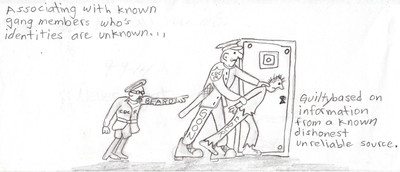
Gang Validation: Justification for Torture and Social Control

Let’s put aside for now the reality that the U.$. military and police force is the biggest gang in world history. If anyone is organized in criminal activity and terrorism, it’s them. That any U.$. government agency claims to be against gang activity without being critical of itself is just a joke.
The entities identified as gangs by the California Department of Corrections and Rehabilitation (CDCR) include correspondence study groups such as the William L. Nolen Mentorship Program. In Texas, Under Lock & Key is cited as a security threat group, despite actually being a newspaper. The National Gang Crime Research Center recently published a report which included the Maoist Internationalist Movement as a potential threat to prison security. It is obvious that the gang label is not used for criminal, but instead political, reasons.
Often, validation is based on secret evidence that the prisoner cannot challenge, and can include things like talking to the wrong persyn in the yard, being in possession of books on history and politics, or even sending someone a birthday card. In some cases validation is based on a prisoner receiving an unsolicited letter mentioning the name of another prisoner, or even just participating in MIM(Prisons) correspondence study groups. A Connecticut writer describes the difficulty fighting “evidence” about security risk group activity:
“In August I was taken to segregation because a prisoner got caught with 4 pages of Security Risk Group (SRG) paperwork and the pigz try to say one of the 4 pages was in my handwriting. Due to this assumption I was given a class A SRG ticket for recruiting, even though this prisoner signed a statement explaining the paperwork is his. I never gave it to him, and I never wrote it. The crazier thing is the prisoner who got caught with these papers was released back into Phase 3 (back into the block) and I sat in segregation for over a month till I was transferred back to Phase 1 in Walker Correctional Institution.”
Once validated, it’s very difficult to get out of isolation without giving the administration information (snitching) on others; information that many prisoners don’t even have because they aren’t actually members of the groups the prison has “validated.” In the article “(Un)Due Process of Validation and Step Down Programs” cipactli gets into the politics behind these programs.
Some people who are validated are members of lumpen organizations (LOs), and the prisons use the “gang” label to make them out as scary and dangerous groups. But lumpen organizations are a natural response to national oppression, and many of these LOs have the potential to lead their members in anti-imperialist organizing. The unity and organization of LOs scares the imperialists and their lackeys. After all, LOs operate outside of the state-approved capitalist economy and serve a lumpen population whose interests are not tied up in that system, unlike the vast majority of U.$. citizens.
Often validation is used to target and isolate politically active prisoners who speak up and fight the criminal injustice system, whether or not they are part of an LO. Fighting against gang validation is an important part of the fight against prison control units and other methods of social control that target politically active prisoners. These comrades are the leaders of the movement against the criminal injustice system behind bars.
The overwhelming response to our call for information on validation for ULK suggests that a disproportionate number of readers of anti-imperialist literature are a target for gang validation (about half of our readers are in some kind of solitary confinement). This issue of ULK includes a variety of articles describing the false justifications used for validation, the targeting of activists, and the consequences of isolation and torture for those who are validated.
In this issue many writers describe their experiences with validation programs, and we also talk about ways to fight the validation system. Building unity among lumpen organizations in the United Front for Peace in Prisons, campaigning to shut down prison control units, and fighting the legitimacy of so-called step down programs are all ways we are attacking this problem from many sides. Prisons serve the imperialists as a tool of social control, and as is explained in the “(Un)Due Process of Validation and Step Down Programs” article, control units are a vitally important element of this system. We can use the contradictions inherent in the system which raises the political consciousness of those targeted for repression, and often throws together leaders who can join forces to build a broader movement. After all, the recent series of California hunger strikes were led by prisoners locked up in Pelican Bay’s notorious control unit.
The U.$ government won’t give up their tools of social control willingly. And in the end the criminal injustice system needs to be thoroughly dismantled, something we can’t do until we overthrow the imperialists and replace them with a government serving the interests of the world’s oppressed. But as a part of the work to build towards communist revolution we battle today to shut down prison control units and end the targeting of prison activists and oppressed nations.
Related Articles:This article referenced in:








